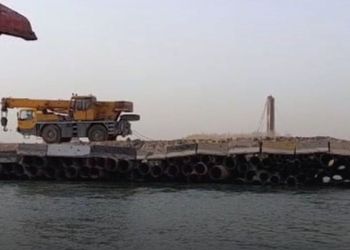This post is also available in:
![]() العربية
العربية
Since the ISIS seizure of vast areas in Deir Ezzor in 2014, the group has aimed to exploit and take advantage of the people of the province by relying on multiple means, including imposing taxes on civilians and merchants under the pretext of ‘’ Zakat’’.
The so-called ISIS Zakat department is in charge of imposing taxes on the poor and merchants in Deir Ezzor province. The employees of the Zakat department, who are ISIS members, inspect the goods available in shops belonging to civilians and then determine the amount of Zakat money every shop owner must pay to the department. Sometimes they can freely demand fictional amount of money to be paid as Zakat.
Zakat is one of the reasons of poverty in Deir Ezzor
ISIS is imposing Zakat on people in a time where they are not even able to meet their basic human needs, worsening the situation for them and forcing them to pay an amount of money they cannot afford on the pretext of paying Zakat and fulfilling Allah’s obligation.
ISIS spends most of the money it collects from Zakat in funding its military activities across Syria, Iraq and elsewhere, while claiming that it uses it to help the poor and reconstruct damaged civilian buildings in areas under its control. Civilians living under ISIS control in Deir Ezzor province have not noticed any reconstruction of buildings or facilities; nothing has changed at all so far.
Saud, a shop owner in rural Deir Ezzor, told D24 that ISIS members come to his shop every month to collect Zakat money from him. A Tunisian ISIS member has imposed a sum of money estimated at 70 thousands Syrian lira to be paid as a tax on his shop, he pointed out that he had to pay 75 Syrian lira to another ISIS member of Egyptian origins who had been in charge of collecting Zakat money in rural Deir Ezzor before. He added that civilians are not in a position where they can reject to pay the Zakat money and in case they do, they will definitely end up in an ISIS-run prison.
Abu Omar, a former shop owner for irons in the city of Myadin, says that after being unable to pay the Zakat money to ISIS he had to shut down his shop. He is working now as a taxi driver in Myadin and villages near it in an attempt to escape ISIS taxes, including Zakat.
Where does the Zakat money go?
Um Omar from the area of Shaitat, who lives now in Buqruss, east Deir Ezzor countryside, says that ISIS executed three of hers sons during battles in Shaitat area, and now she is living on the money given to her by civilians in the province as charity. Whenever she goes to ISIS Zakat department to ask for help she gets rejected as their sons were ‘’ apostates’’ according to ISIS. She cannot get even a small amount of sugar from the department.
She adds that one day she was detained and put in a jail for one hour by a group of ISIS members who threatened her with prison and torture in case she does not stop coming every day to the Zakat department.
ISIS keeps manipulating civilian in Deir Ezzor using different means and pretexts to not help them with the collected Zakat money. Um Omar and her sons are ‘’ apostates’’ according to the group.
Elderly people who have lost their sons in Coalition airstrikes on rural Deir Ezzor are also deprived of the Zakat money stored in ISIS budget. Abu Mohamed, whose sons were killed in a coalition airstrike on rural Deir Ezzor, asked ISIS for an amount of money that might help him overcome the horrible and distressing situation he is going through after losing his two sons.
However, his request was rejected by the group, and he was told to get a job and that the group is not in a position to help people like him. Those foreigners who have joined ISIS and are currently living in areas under its control deserve more help than the local civilians, a group of ISIS members told Abu Mohamed.
It should be pointed that ISIS had previously published what it called an infographic showing the distribution of Zakat money to the poor and need in Syria. Aleppo province was at the top of the areas that ‘’ benefited’’ from the Zakat money.










